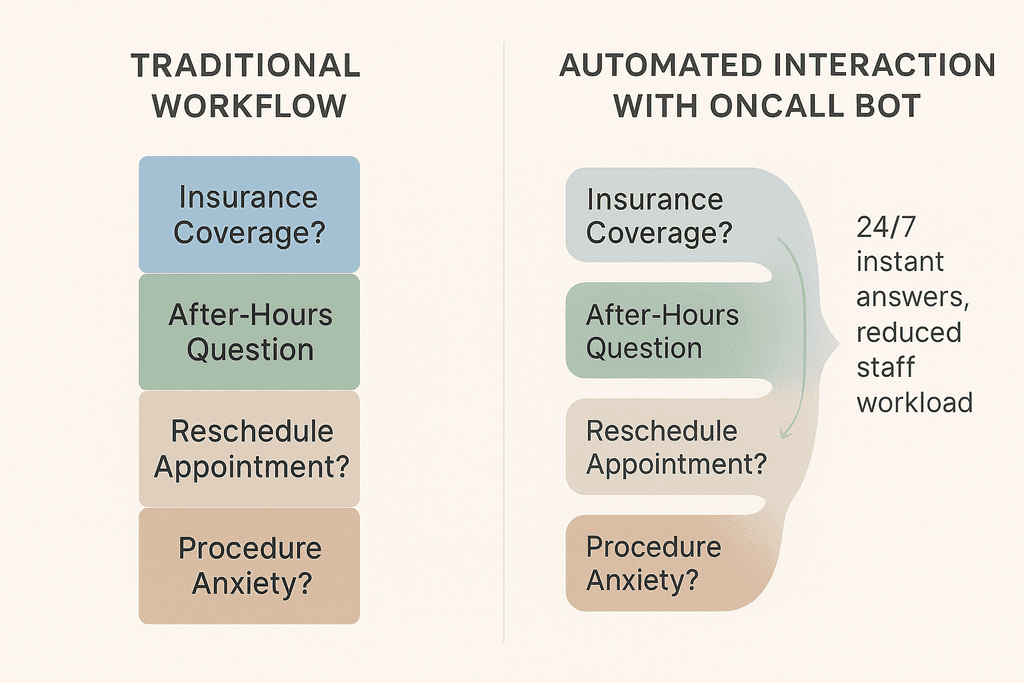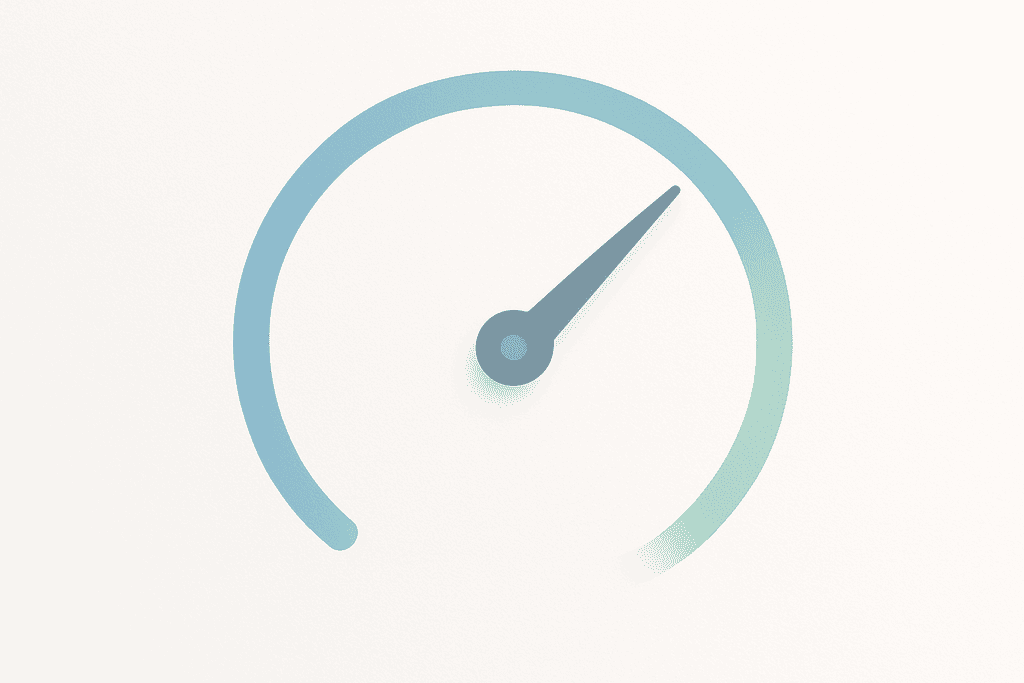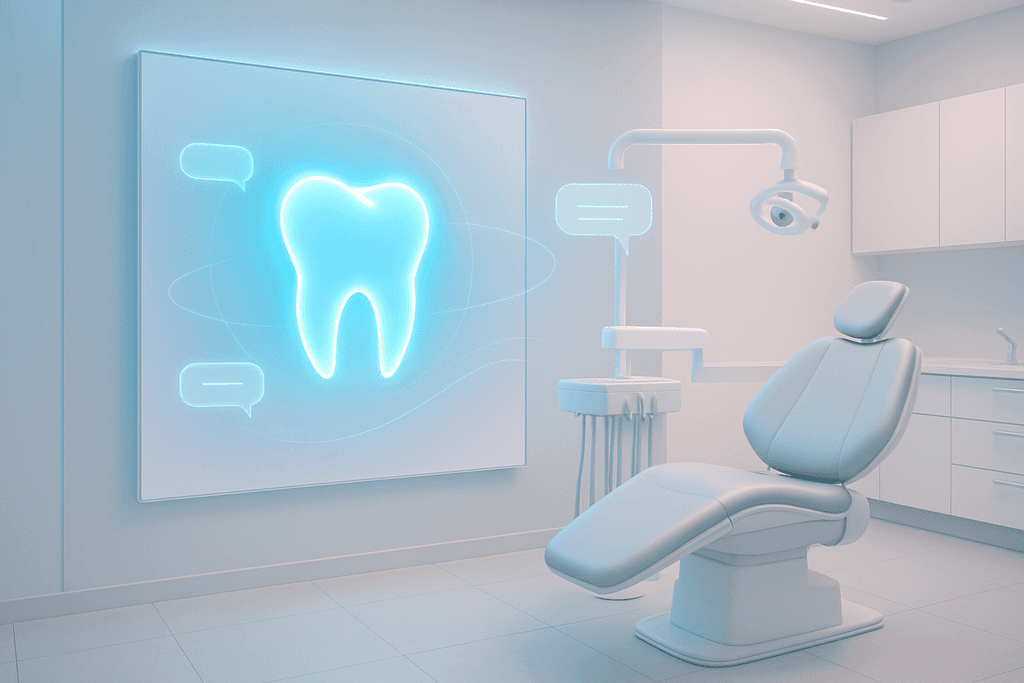Imagine needing urgent dental advice at 2 AM, but your dentist’s office is closed. Dental chatbots are revolutionizing patient care by providing instant, accurate answers to oral health questions around the clock. These AI-powered assistants, like The OnCall Bot, are transforming how dental practices communicate with patients, offering convenience and peace of mind while streamlining office operations.
Table of Contents
Challenges in Dental Patient Communication
Dental practices juggle a constant stream of patient questions, from “Do you take my insurance?” to “How soon can I eat after a filling?” These inquiries flood phone lines and inboxes, often overwhelming staff.

Let’s break down the main hurdles dental offices face:
- High volume of repetitive questions
- After-hours communication gaps
- Administrative overload
- Appointment scheduling bottlenecks
- Patient anxiety about procedures
Did you know that dental offices spend an average of 15-20 hours per week just answering routine patient questions? That’s time that could be spent on more complex patient care.
Here’s a quick look at how patient communication typically breaks down:
| Communication Type | Percentage of Total |
|---|---|
| Appointment-related | 40% |
| Treatment questions | 30% |
| Billing inquiries | 20% |
| Other | 10% |
Many dental practices struggle to keep up, especially after hours when patients still need info. This can lead to missed appointments, patient frustration, and lost revenue. Some offices try using answering services, but these can be costly and impersonal.
So what’s the solution? More practices are turning to AI-powered chatbots to handle these common questions. These digital assistants can provide instant answers 24/7, freeing up staff time and improving patient satisfaction. Our product, The OnCall Bot, does just that – offering round-the-clock support tailored specifically for dental practices.
But how exactly do these chatbots work, and what impact can they have on a dental practice? Let’s dive deeper into the world of dental AI assistants.
Recent case studies have shown that AI solutions can significantly boost efficiency and patient satisfaction in dental practices. But the real game-changer is how these tools are reshaping patient communication.
How Dental Chatbots Work
Dental chatbots use smart AI to understand and respond to patient questions. They’re like having a knowledgeable dental assistant available 24/7. These bots can handle everything from booking appointments to explaining procedures.
- Natural language processing helps bots understand patient queries
- Personalized responses based on each patient’s needs
- Integration with practice systems for seamless information flow
The OnCall Bot, for example, uses dental-specific AI to give accurate answers about treatments, costs, and aftercare. It’s not just a generic chatbot – it’s tailored for dental practices.
Enhancing Patient Experience with Real-Time Answers
Patients often have questions at odd hours. Dental chatbots fill this gap by providing instant help anytime. This quick access to information can ease anxiety and improve overall patient satisfaction.
- Available 24/7 for urgent questions
- Reduces wait times for information
- Provides consistent and accurate responses
A study on emergency dental care showed that chatbots could effectively guide patients through urgent situations. You can read more about it here.
Streamlining Dental Practice Operations
Dental chatbots do more than just answer questions. They’re powerful tools for making dental offices run smoother. Here’s how they help:
| Task | How Chatbots Help |
|---|---|
| Appointment Scheduling | Automate booking process |
| Phone Calls | Reduce volume by handling common queries |
| Patient Follow-up | Provide detailed interaction transcripts |
By handling these tasks, chatbots free up staff to focus on more complex patient needs. This can lead to better care and a more efficient practice overall.
Real-World Impact
Dental practices using chatbots are seeing real benefits. One clinic reported a 30% reduction in phone calls after implementing a chatbot. Patients appreciated the quick responses, especially for simple questions about office hours or insurance.
The OnCall Bot goes a step further by offering:
- Unlimited patient interactions
- Detailed conversation transcripts
- Easy integration with existing systems
These features help practices of all sizes improve their patient communication without breaking the bank.
Looking Ahead
As AI technology advances, dental chatbots will only get smarter. Future versions might offer:
- Multilingual support for diverse patient populations
- Integration with wearable health devices
- More advanced diagnostic assistance
While chatbots won’t replace human dental professionals, they’re becoming an essential tool for modern practices. By handling routine tasks and providing instant information, they allow dental teams to focus on what matters most – providing excellent patient care.
If you’re curious about how a dental chatbot could help your practice, check out this article on the potential impact of AI in dental offices. It’s an eye-opening look at where the industry is headed.

The Future of AI in Dental Care
Dental chatbots are quickly becoming indispensable tools for practices looking to boost efficiency and patient satisfaction. As AI technology advances, these virtual assistants are poised to take on even more sophisticated roles in dental care.
Here are some key ways AI chatbots are likely to evolve in the near future:
- Enhanced diagnostic capabilities
- Seamless integration with practice management systems
- More natural, empathetic conversations
- Ability to handle complex scheduling and insurance queries
One of the most exciting developments is the potential for chatbots to integrate with advanced diagnostic tools. Imagine a chatbot that can analyze photos of dental issues sent by patients and provide preliminary assessments. This could help triage urgent cases and provide peace of mind for minor concerns.
Multilingual support is another frontier for dental chatbots. As practices serve increasingly diverse patient populations, the ability to communicate in multiple languages becomes crucial. The OnCall Bot, for example, is already planning to expand its language capabilities to meet this growing need.
| Current Chatbot Features | Future Possibilities |
|---|---|
| Appointment scheduling | AI-powered treatment planning |
| Basic FAQs | Personalized oral health coaching |
| Office hour information | Real-time insurance benefit checks |
Personalized care reminders and follow-ups represent another area where AI chatbots can make a significant impact. By analyzing patient history and treatment plans, chatbots could proactively reach out with tailored reminders and educational content.
While these advancements are exciting, it’s important to remember that chatbots are meant to augment, not replace, human dental professionals. The goal is to free up staff time for more complex patient interactions while improving overall care quality and accessibility.
- Improved patient engagement
- Reduced administrative burden on staff
- More efficient triaging of dental issues
- Better data collection for personalized care
As dental practices look to the future, investing in AI-powered chatbot technology like The OnCall Bot can help them stay ahead of the curve and deliver exceptional patient experiences. By embracing these tools now, practices can position themselves for success in an increasingly digital and patient-centric healthcare landscape.
A recent study published in BMC Oral Health highlights the potential of AI-based chatbots in clinical decision support for dental professionals. This research underscores the growing role of AI in enhancing both patient care and clinical practice efficiency.
Wrap-up
Dental chatbots are changing how practices connect with patients. They offer quick answers any time, day or night. This means fewer phone calls and happier patients. Practices that use chatbots can focus more on actual dental work instead of answering the same questions over and over.
The OnCall Bot is one option that helps dental offices run smoother. It handles basic questions, appointment requests, and even gives detailed chat records to the staff. This saves time and keeps things organized.
As dental care keeps evolving, tools like chatbots are becoming must-haves. They help practices stay current and give patients the fast service they expect. Plus, they free up staff to focus on in-office care. Curious about how a chatbot could fit into your practice? Check out our features page to learn more about what The OnCall Bot can do.
Next up, we’ll answer some common questions about dental chatbots. These FAQs will help clear up any lingering doubts you might have about using AI in your dental practice.
Common Questions About Dental Chatbots
How much does a dental chatbot cost?
Dental chatbot pricing varies, but many solutions offer affordable monthly plans. For example, The OnCall Bot charges a one-time $495 setup fee and $49.99 per month for unlimited patient interactions. This makes it accessible for practices of all sizes while providing a strong return on investment through improved efficiency and patient satisfaction.
Are dental chatbots HIPAA compliant?
Yes, reputable dental chatbots are designed with HIPAA compliance in mind. They use secure encryption and data handling practices to protect patient information. It’s important to choose a chatbot specifically built for healthcare to ensure proper security measures are in place.
Can chatbots integrate with my existing practice software?
Many dental chatbots are designed to work seamlessly with common practice management systems. They often offer simple integration processes that don’t require major changes to your existing workflow. Always check with the chatbot provider about compatibility with your specific software.
What types of questions can a dental chatbot answer?
Dental chatbots can handle a wide range of inquiries, including appointment scheduling, basic dental care questions, service information, and emergency guidance. They’re programmed with dental-specific knowledge to provide accurate, helpful responses to common patient questions.
How do patients interact with a dental chatbot?
Patients typically interact with dental chatbots through a chat interface on your practice website or Facebook page. The chatbot uses natural language processing to understand patient queries and provide relevant answers. This allows for 24/7 support without requiring constant staff availability.

No responses yet